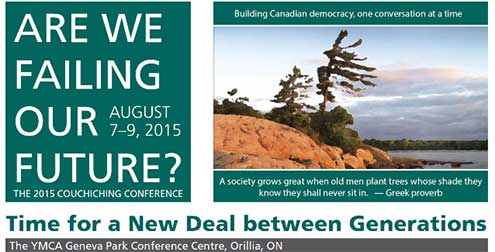 That is the question the delegates to this summer’s 84th Couchiching conference asked last weekend. The precise title was more melodramatic: “Are we failing our Future?” and the answer was, as anybody could have predicted, yes and no.
That is the question the delegates to this summer’s 84th Couchiching conference asked last weekend. The precise title was more melodramatic: “Are we failing our Future?” and the answer was, as anybody could have predicted, yes and no.
The purpose of conferences of this sort is not to come up with answers, but to look at the state of the world and select the topics that are on everybody’s mind and examine them with the help of experts who know more about them than most of us do. If the experts don’t agree with each other, so much the better. It’s the process that matters, and the quality of the thinking, and we all know there is not one truth. Under the heading of Intergenerational Transfer, three subject areas were discussed: the fiscal transfer, the environmental transfer and the institutional/democratic transfer.
I have so far attended about sixty of the eighty-four Couchiching conferences and can testify that the level of discussion has remained remarkably high. This is a credit to the members of the Program Committee, who spend endless hours trying to find the right approaches and to attract the most rewarding speakers. It is also a credit to all the other volunteers who make invaluable contributions.
But the main reason for the continuing vitality of the Institute is the uniqueness of the enterprise, the face-to-face encounters in beautiful surroundings near Orillia, Ontario, of high spirits and, above all, surprisingly, the presence of many young people.

 The book, Otto & Daria: A Wartime Journey Through No Man's Land, was launched on Saturday, September 24.
The book, Otto & Daria: A Wartime Journey Through No Man's Land, was launched on Saturday, September 24. 